I have a soft spot for commencements. And, as I get on in years, that spot gets even softer.
Part of it, undoubtedly, is because recognizing the hard work and accomplishments of the new graduates is so much more fun than the grading that immediately precedes it. But for me, part of what grabs me is the feeling that what I’m doing — the notion of education and its larger value that I’m trying to impart — connects me to a tradition that is hundreds of years old. One visible sign of that connection is the academic regalia that graduates and faculty alike wear to commencement ceremonies. In the medieval universities, when education was recognized as a calling (and was generally undertaken to serve the church), the students and the teachers wore clerical-looking gowns all the time. While some of us get away with wearing blue jeans and smark-alecky T-shirts in our teaching, the academic gowns we wear at graduations and convocations connect us to this tradition.
But I’ve had issues with the academic regalia I purchased on the occasion of the conferral of my Chemistry Ph.D. **cough** 12 years ago:
- The gown wouldn’t stay closed.
- The hood wouldn’t stay anywhere near where it was supposed to (translationally or rotationally).
My pet theory on this is that the makers of academic regalia for purchase hate professors and want them all to look like fools. (Rented regalia tends to come equipped with zippers and other such conveniences.) But no longer will I be using binder clips to keep my regalia in formation. In preparation for this year’s commencement ceremonies, I have undertaken a regalia retrofit. Details (and photos) after the jump.
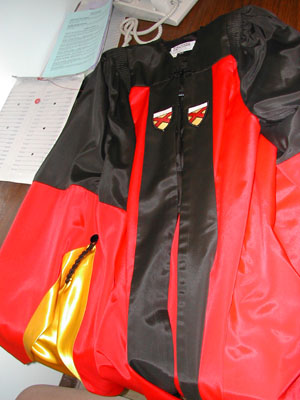
First, for those who haven’t been in close proximity to a college campus in a while, here’s what my academic gown looks like. Yes, it’s colorful. Generally, it’s a good thing for the gown not to be completely black, because sitting in full sun at this time of year, you might just burst into flames. That would be way more disruptive than the beach ball those Creative Arts majors will be batting around during the speeches.
For those in the know, the sleeve-lining color tells you something about the field in which the wearer earned his or her doctorate. That golden-yellow sleeve-lining indicates “science”. (Why don’t the special sciences each get their own color? It’s either a show of solidarity or a lack of strong lobbying.)
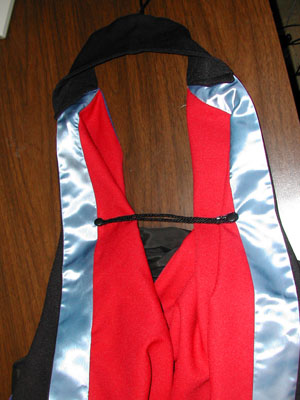
Here’s what my hood looks like. Despite the fact that these originated as actual functional hoods, designed to give some protection from the elements, the only one I’ve ever seen wear an academic hood as a hood was my father. It made him look a lot like the Emperor from Return of the Jedi — not the look most of us are going for at commencement.
The lining color on the hood is related to one’s schools, and the color of the major stripes along the side of the lining is keyed to one’s discipline (and thus usually matches the sleeve-lining color). This is the hood I got when I earned my Philosophy Ph.D. (technically, a doctor of philosophy in philosophy). Philosophy’s color is blue. My regalia sends mixed signals about my tribe membership.
So, here’s how I fixed the regalia without binder clips.
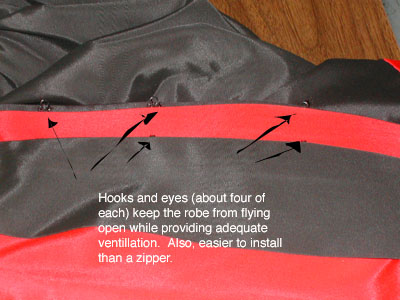
The most pressing problem was the flying-apart-y-ness of the gown. Among other things, this puts pressure on the hapless academic to wear nice clothes under the regalia. Keep in mind that the getting dressed happens very early on a Saturday morning — in other words, the outer layer is really all you can be counted on to manage well.
A zipper would have been too much hassle to add since it would involve actually ripping existing seams and resewing them with the zipper, and I wanted neither to schlepp a sewing machine to the office nor to schlepp my regalia home. Also, given how hot it can be, a zipper might have restricted air flow in an undesirable way. Thus, I opted for four hooks and eyes.
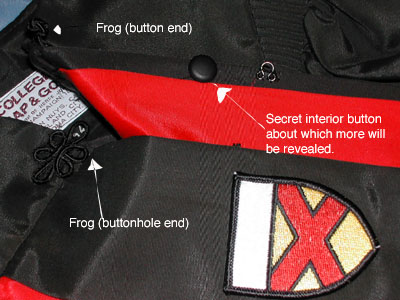
At the throat of the gown, I also added a silk frog closure. It’s black, like the gown, so it blends in pretty well. Also, it seems to take some of the pressure off of the four hooks and eyes. (I have a feeling someone in an engineering department could have contributed an appropriate stress analysis as i was working all this out.)
You’ll notice a little black button right above one of the eyes. What’s that button for? You’ll see in a moment.
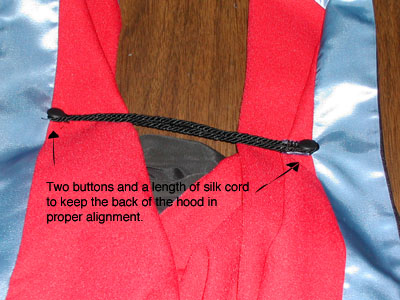
So next we look at the hood modifications. As purchased, the hood had a tendency to slide every which way. It would either slip down my back (with the front part digging into my trachea), or off my shoulders (seeking to escape!), or otherwise pathetically askew. Worse, the hood would not stay properly fanned so as to display its colors (Philosophy represent!).
To achieve the proper fanning out, I added two buttons to the back of the hood and attached them with a length of silk cord. Getting the length just right took a few tries, but it’s not like I had a mannequin handy. Also, it turns out that even the eye-end of a sewing needle is fairly sharp, and thumbs can bleed fairly profusely.
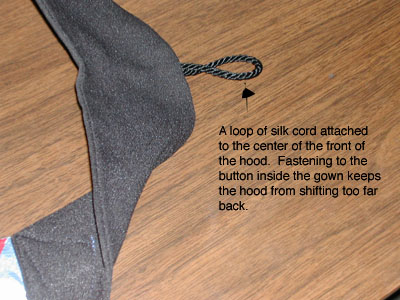
The last modification addressed the proper alignment of the hood with respect to neck and shoulders. If I were a habitual necktie wearer (which I am not), I could simply tuck the narrow fabric band at the front of the hood under the knot of my tie. My alternative solution was to sew a short loop of silk cord to the middle of that narrow fabric band.
The bottom of the loop hooks around that hidden button I sewed to the inside of the placket of the gown. The hood no longer strangles.
I may be a geek, but I think I now have the means to look presentable at commencement.

Very nice. But, to be honest, I am a bit disappointed. I was expecting pictures of you wearing the regalia. 😉
Yes, a full state portrait is in order methinks.
In Gaudy Night, remember, Harriet has to go up to the attic and haul out a trunk where her gown and MA hood have lain undisturbed for years. A butterfly flutters out as she beats out the dust in the slanting light from a window. Later, putting them on in her borrowed college room whose “present occupant was evidently a very short woman” so she has to stoop to see into the mirror, she finds the hood gives her some trouble till she remembers “the twist that allowed it to lay flat” with one black and one colored shoulder. (Quotations dredged from memory — I can’t find my copy.)
No frogs or secret buttons, apparently. But then, Harriet is not a scientist.
good heavens, of course it had to “lie” flat. Sorry, Miss Sayers.
Hey, the good part of geekiness is being able to *fix* stuff that doesn’t work! Looks like you’ve made a sophisticated attack on the design flaws of the garment….
The driver for the retrofit is that we don’t wear these for functional purposes any longer. Rental companies could make us wear Chinese water torture suits and convince us they were representative of our alma mater. I once had a rental company provide me with a doctoral hood from the athletic arch-rival of our U (I guess they thought it sufficient to get the name of the state correct, but not the exact university).
So, ultimately, one was purchased for me by my U after I received a good number of marginally-deserved teaching awards. I wore it proudly b/c the colors were at least correct. But when I couldn’t get a job at a lesser state U when family medical matters required me to move back east, I did what any angry boy would do: I set it on fire. It made good compost for the tomato plant that replaced it this year.
I feel better now, and simply volunteer to teach at local Us, but I’ll have to get new regalia if I ever have to attend another commencement if another U hires me!
Like the stress analysis of an evening gown?
Rats!
None of this will work on our Commonwealth style (Oxford Cambridge) gowns that are supposed to sit open. The guys are able to keep the hood in place using their ties but the women have to resort to safety pins and the like.
The only time I wore my gown was on my graduation and, as Nat says, the only way for a women to keep the hood in place was with a safety pin. The guy fitting me seemed to be embarrassed to put the pin in the appropriate place – I was wearing a tight dress – and so did it with his eyes shut and his arm held out from his body as far as possible, trying not to touch me. He probably wasn’t helped by my laughter.
The color rules in Britain are different too. It is to do with your university and the faculty (science/arts/engineering) that awarded your PhD. At Leeds University the gown was emerald green. The whole gown and, I seem to recall, the hood too. So lovely. My Dad’s (Birmingham U, Faculty of Arts) was brick red.
It’s my understanding that the damn gowns are made for men, with absolutely no concessions for women. My adviser pointed out that the shiny gold pins on the UT Austin robe are placed directly over the nipples. Nice work, eh?
Oh, and for the uninitiated, these robes are EXPENSIVE. Checking out the prices may induce choking.
Dear Janet:
You should not have gone into the trouble of fixing your gown to close and your hood to hold below your throat! You must have spent countless hours and a lot of effort must have gone into it.
Nowadays the Stanford gown that you have — whether rented or purchased — comes with a zipper while the hood goes with a string.
Best.
Dear Janet,
Having just received my LONG awaited official regalia from Stanford (my university’s gift for successful tenure & promotion) I fear I have to disagree with the last post — at least some places, the Stanford gown still comes open, no zipper, with nowhere immediately visible for a woman to wind a string holding her hood into place. Regalia designed for men, like the rest of the institution…
But at least there are people like you sharing exactly the kind of information I was seeking online. Thanks!
Thank you, Janet. I was just wondering why Stanford regalia is so user-unfriendly. I am sharing your blog with my friends via Facebook…
You can easily keep the hood in place but drawing a cord behind you (inside the gown) under your arms and tied at the front with the hood’s loop. To avoid the hood slipping down the shoulders, you should wear it with the neckband as close to the neck as possible. The mistake is to wear a collarless shirt or a shirt that is too light or the neckband too far down.
The beauty of the Stanford robe is that it is worn open, so as not to approximate a portable sauna. On the East Coast our graduations are also hot and humid. My doctoral robe has snaps that allows me to wear it open (the snaps secure the folded front area inward). The hood slides, chokes, and pulls at the shirt buttons, but when I think of the years it took to finish the dissertation, I bear the inconvenience proudly. I too enjoy commencement ceremonies, more so after watching a YouTube video of Harvard’s where a centuries old formula is read at the granting of degrees admitting doctors into the ancient traditon of scholars.
Pingback: Nostalgia for commencements of yore. | Adventures in Ethics and Science